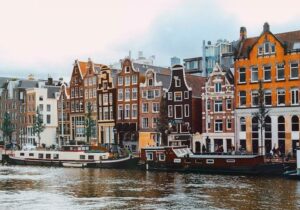Europe is an attractive destination for digital nomads. With its mix of vibrant cities, reliable infrastructure, and rich cultural heritage, it offers the perfect work-life balance.
According to the latest the Global Intelligence Unit’s Digital Nomad Report, Europe has become a leading destination for digital nomads in the past years. The report reveals that 9 out of the top 10 digital nomad destinations are located in Europe.
Spain tops the list of digital nomad-friendly countries with Malta and Portugal occupying 6th and 7th place respectively. Not only do these countries offer robust infrastructure and fast internet speeds but also have strong expat communities, good quality of life, accommodating visa options, and tax benefits for remote workers.
From sunny Lisbon in Portugal to the history-filled Florence, Italy, this guide rounds up the best European cities for digital nomads:
10 Best European Cities for Digital Nomads
1. Lisbon, Portugal

This country ranks 6th in the world when it comes to Global Passport’s Quality of Life index, meaning it’s an affordable place to live in, overall happiness is high, and the locals are welcoming to foreigners.
What’s more is that the economy is constantly growing, especially with foreign investors seeking the Portugal Golden Visa. Foreign remote workers wanting to live in Lisbon can apply for the Portugal Digital Nomad Visa. The capital city has emerged as the heart of Europe’s digital nomad scene.
Lisbon is a primary example of a freelance-friendly city. It provides remote workers with city-spread WiFi with a reliable internet connection, excellent public transportation systems, lively streets filled with amazing architecture, and mouthwatering cuisine at every corner. All of this makes it one of the most popular cities for working remotely in Portugal.
Here is a brief overview of the cost of living in Lisbon:
- Rent (in city center): €1,400-€1,500 per month (one-bedroom apartment) and €2,600-€2,700 (three-bedroom apartment in city center
- Rent (outside city center): €1,099 per month (one-bedroom apartment) and €1,717 for a three-bedroom apartment)
- Groceries: €150 to €350 per month for one person
- Bus Transport: €2 for one-way bus trip, €40 for a monthly pass
2. São Miguel, Azores, Portugal

Some freelance communities are centered around the country’s thriving metropolitan hubs, while others are spread across the nation’s remote islands, such as the Sāo Miguel Island in the Azores.
This island’s lush green forests, remoteness, hot springs and crater lakes have made it a spiritual getaway for many digital nomads.
Here is an overview of the average cost of living in Sāo Miguel:
- Rent (city center): €400 to €600 per month (one-bedroom apartment) and €1,500 per month (two-bedroom apartment)
- Rent (outside city center): €650 to €780 per month (one-bedroom apartment) and €600-€1500 per month (two-bedroom apartment)
- Groceries: €150 – €300 per month for a single person
- Transport: €2 per single bus trip, €40 for a monthly pass
3. Valletta, Malta

Living and working in Valletta, you’ll have access to fantastic Mediterranean weather, delicious cuisine, and a laid-back lifestyle in a thriving European city.
By acquiring the Malta Digital Nomad Visa, you can easily take advantage of visa-free travel across the European Union (EU) and the Schengen Zone, which makes it easy to maximize your remote working.
The city has strong 5G internet, affordable transportation costs, and high political stability, and it can also be a great place to connect with other successful entrepreneurs.
Here is an overview of the cost of living in Valletta:
- Rent (city center): €900 – €1,400 per month (one-bedroom apartment, €1,200 to €1,800 per month (two-bedroom apartment)
- Rent (outside city center): €700 and €1,100 (one-bedroom apartment)
- Groceries: €200 – €320 per month for one person
- Bus Transport: €2.50 per single day trip (summer) or €2.00 per single day trip (winter), €25 for a 7-day unlimited pass or €21 for 12-journey card
4. Zurich, Switzerland

This city is one of the most rewarding to explore as a digital nomad, making the pricey cost of living worthwhile.
The high quality of life, many co-working spaces, fast internet connection, safe and efficient public transport has made it an accessible and pleasant community for remote workers.
Here is an overview of the cost of living in Zurich:
- Rent (city center): CHF 960 – CHF 3,800 per month (one-bedroom apartment), 1,300 to CHF 5,100 per month (two-bedroom apartment)
- Rent (outside city center): CHF 1,400 and CHF 2,500 (one-bedroom apartment), CHF 2681,41 per month (two-bedroom apartment)
- Groceries: CHF 400 – CHF 700 for a single person per month
- Bus Transport: CHF 4.40 per single trip, CHF 85 for a monthly pass
5. Palma, Spain

Perfect to spend autumn and winter due to its favorable Mediterranean weather, it offers beautiful architecture, numerous galleries and museums, great food, and over 300 natural beaches.
If you’re considering applying for the Spain Digital Nomad Visa, try planning around visiting Palma in September or October, when tourism is at its lowest and rental prices are most reasonable.
Here is an overview of the cost of living in Palma:
- Rent (city center): €900 – €1,400 per month (one-bedroom apartment), €1,200 – €2,125 per month (two-bedroom apartment)
- Rent (outside city center): €750 and €1,000 per month (one-bedroom apartment), €1,062.50 to €2,062.50 per month (two-bedroom apartment)
- Groceries: €209.50 to €307.45 per month for one person
- Bus Transport: €2 for urban routes, €15 for a 10-trip prepaid card
6. Glasgow, Scotland

The Victorian-style apartments are quite affordable and spacious with many relaxing bed-and-breakfast rentals to also choose from.
Life in Glasgow is great for night owls who like going for pub crawls and attending live music performances after a day in front of the laptop.
For those who prefer slow living, the city is packed with galleries, exhibits, and museums for more calming activities. The city is filled with sun-lit co-working spaces and fast-speed internet connections, allowing you to focus on your tasks ahead. For foodies there are a variety of culinary experiences on every other corner.
Here is an overview of the cost of living in Glasgow:
- Rent (city center): £900-£1000 per month (one-bedroom apartment), £1200-£1500 per month (two-bedroom apartment)
- Rent (outside city center): £800-£1000 per month (one-bedroom apartment), £1000-£1400 per month (two-bedroom apartment)
- Groceries: £150 to £250 per month for one person
- Bus Transport: £2.10 to £6.70 per single trip, £77 – £99 for a monthly pass
7. Belfast, Northern Ireland

The city has free WiFi hotspots, high internet speed, and some of the best digital cafes and co-working spaces. The general cost of living in Belfast is quite reasonable compared to the US or the rest of Europe.
Here is a general overview of the cost of living in Belfast:
- Rent (city center): £685 per month (one-bedroom apartment) £1,000 per month (two-bedroom apartment)
- Rent (outside city center): £915 per month (studio apartment), £1,350 per month (three-bedroom apartment)
- Groceries: £50 to £200 per month for one person
- Bus Transport: £2.10 per single trip, £63 for a monthly Metro pass
8. Florence, Italy

With the help of the Italy Digital Nomad Visa, foreign workers can now expand their creative skill set in an inspiring city.
It is also a thriving student city, meaning you’ll find comfortable co-working spaces to work in and a welcoming international community to integrate with.
Here is an overview of the cost of living in Florence:
- Rent (city center): €900 – €1200 per month (one-bedroom apartment), €1100 – €1400 per month (two-bedroom apartment)
- Rent (outside city center): €700 – €900 per month (one-bedroom apartment), €1,000 – €1,400 per month (two-bedroom apartment)
- Groceries: €150 to €300 per month for one person
- Bus Transport: €1.50 per single trip, €35 for a monthly pass
9. Amsterdam, The Netherlands

Many places in this city are open until late so you won’t have to worry about missing out on all the fun while working all day.
Make sure to visit Amsterdam in the off-season (late October to mid-March), so you can enjoy walking around without too much tourist congestion in the streets.
Here is an overview of the cost of living in Amsterdam:
- Rent (city center): €1,500 – €2,500 per month (one-bedroom apartment), €3,000 upwards (two-bedroom apartment)
- Rent (outside city center): €1,200 – €1,800 per month (one-bedroom apartment), €2,000 – €3,000 per month (two-bedroom apartment)
- Groceries: €250 to €450 per month for one person
- Bus Transport: €9.50 for a single day trip, €195 for a 4-star monthly pass
10. London, United Kingdom

Many cultures converge in London, making it a great place for digital nomads to network with other like-minded individuals.
While finding suitable accommodation at an affordable price during your stay may be challenging, you’ll find plenty of shared flats for rent and a big couch-surfing community.
As an international hub, it offers many co-working spaces and fast-speed internet cafes. Once the day ends and you’re done with work, you can easily find entertainment around every corner.
Here is an overview of the cost of living in London:
- Rent (city center): £1,500 – £2,500 per month (one-bedroom apartment), £3,000 to £4,500 per month (two-bedroom apartment)
- Rent (outside city center): £1,200 – £1,800 per month (one-bedroom apartment), £1,500 – £2,500 (two-bedroom apartment)
- Groceries: €250 to €450 per month for one person
- Bus Transport: £6 for a single day trip, £94.90 for a monthly pass
How Can You Be a Digital Nomad in Europe?
Many countries have introduced a Digital Nomad Visa, which allows individuals to live and work in their country for a specified period.
To be eligible, you generally must have your primary work or be contracted to a company outside the host country. Self-employed individuals, freelancers, or businesses that can be managed from anywhere worldwide also qualify for a remote worker visa.
These visas are usually short-term, up to one year, and do not offer a pathway to citizenship. However, depending on the country’s requirements, you may be able to get a residence permit in some cases.
If a country does not offer a specific Digital Nomad Visa, you can opt for a long-stay visa. This type of visa allows you to work and live in a country for an extended period of time.
A tourist visa is not the ideal route to go as it usually doesn’t allow for you to work as well as visit.
Where Can I Get a Digital Nomad Visa in Europe?
Currently, the following 18 European countries offer visas or residence permits that cater specifically for digital nomads:
Albania | Andorra | Croatia | Czech Republic | Estonia | Georgia | Germany |
Greece | Hungary | Iceland | Italy | Latvia | Malta | Montenegro |
Norway | Portugal | Romania | Spain |
8 Factors to Consider Before Moving to Europe as a Digital Nomad
Moving to a European city as a digital nomad is an exciting opportunity because of the diverse cultures and environments that the continent offers. The following factors are important to consider when choosing the best city in Europe for remote working:
1. Cost of living
Research housing, groceries, transportation, and general expenses in to understand your budget, focusing on the most affordable cost options.
2. Work opportunities
Look into job markets in your field within cities for digital nomads and consider whether you’ll need a work visa or other permits in these destinations.
3. Healthcare
Check the healthcare system in your selected city for digital nomads, including the availability and quality of medical services and whether you need specific travel health insurance for nomads.
4. Cultural adaptation
Be aware of cultural differences, local customs, and social norms in your digital nomad destination to help you integrate smoothly into the community.
5. Transportation
Consider the public transport options available in the city, as well as its walkability and accessibility, which are important for a digital nomad lifestyle.
6. Safety
Research crime rates and overall safety in the area to ensure a secure living environment as a digital nomad. Look to locals to know where you should and shouldn’t live and work as they know the city inside and out.
7. Co-working spaces
Look for cities offering many co-working spaces, which can enhance productivity and networking opportunities with fellow digital nomads.
8. Education
If you have children, explore local schools and educational systems in your digital nomad destination, including international or bilingual education options.
How Can Global Citizen Solutions Help You?
Global Citizen Solutions is a boutique migration consultancy firm with years of experience delivering bespoke residence and citizenship by investment solutions for international families. With offices worldwide and an experienced, hands-on team, we have helped hundreds of clients worldwide acquire citizenship, residence visas, or homes while diversifying their portfolios with robust investments.
We guide you from start to finish, taking you beyond your citizenship or residency by investment application.

Frequently Asked Questions about the Best Cities in Europe for Digital Nomads
What are the best European cities for digital nomads?
The best cities for digital nomads in Europe are:
- Lisbon, Portugal
- São Miguel, Azores, Portugal
- Valletta, Malta
- Zurich, Switzerland
- Palma, Spain
- Glasgow, Scotland
- Belfast, Northern Ireland
- Florence, Italy
- Amsterdam, The Netherlands
- London, United Kingdom
Where can I work remotely in Europe?
There are many places in Europe where digital nomads can work remotely. Some of the best places for remote workers in 2025 are Malta, Belfast, Lisbon, Zagreb, and Palma, among others.
Can I live in Europe and work remotely?
Yes, you can work remotely while living in Europe. What permits or visas you need will depend on your citizenship, the European country you plan to reside in as well as your employer’s location and your employment status.
Why is Europe a great place for digital nomads?
Europe is a haven for digital nomads thanks to:
- Well-developed infrastructure, including stable internet access and transport.
- Variety of co-working spaces.
- Relatively affordable cost of living in some areas.
- Tax advantages specifically for digital nomads.
Can I travel around with a Digital Nomad Visa?
Yes, you can travel while you work with a digital nomad visa.
Which European country is the best when it comes to Internet?
Iceland is a top destination if you want the best Internet in Europe with full fiber penetration to 99.99% of the country and access to a Digital Nomad Visa.
What are the safest cities in Europe for digital nomads?
Lisbon, Portugal and Budapest Hungary are two cities known for their relatively low crime rates and vibrant digital nomad communities.
Which European cities have the best co-working spaces for digital nomads?
Lisbon in Portugal’s top-notch co-working spaces is one of the many reasons the city is adored by digital nomads and the community is one of the largest in the world.


